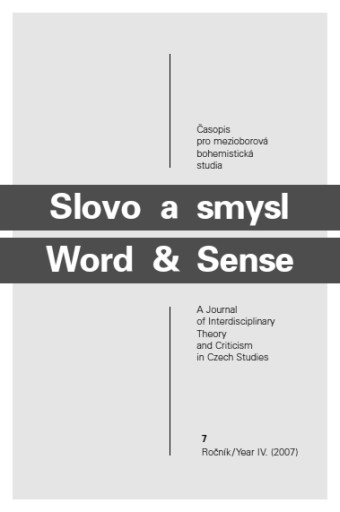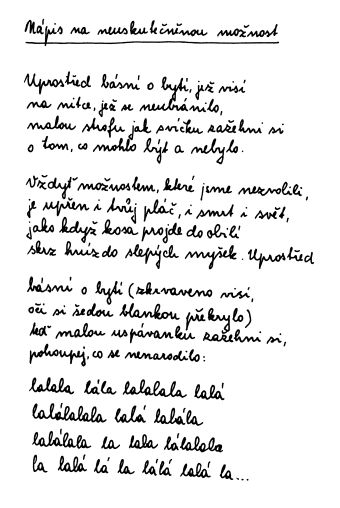Jiřina Hauková. January 27, 1919 – December 15, 2005
Jiřina Hauková was a member of Group 42 found during WW II. Its members considerably influenced development of Czech culture during the second half of the 20th century by giving it the form of a rough urban subrurbia, raw but at the same time intimate voice of outsiders, i.e. multilayered form that was also inspired by a distant “plebeian” country, the United States of America, with its sound of dynamic peripheral jazz. Her husband Jindřich Chalupecký was the group’s chief theoretician and the group’s most famous poet and artist Jiří Kolář belonged among her closest friends. Other members of the group were, for example, artists Kamil Lhoták, František Gross, Jan Smetana, and František Hudeček, a photographer Miroslav Hák, a poet Josef Kainar and writer Jan Hanč. On one hand the group was forming Czech culture but, on the other, the history of Czechoslovakia considerably transformed lives of painters, photographers and poets belonging to this group. Some of them, such as Ivan Blatný, had to emigrate and felt deprived of the use of their mother tongue. His poetry written during his stay in English psychiatric clinic was discovered only by chance. However, other emigrants found new ways to deal with language through its visualization, as it happened to Jiří Kolář in his exile in Paris. Personalities such as a painter and illustrator Kamil Lhoták or a poet Josef Kainar resigned and learnt to accept life in socialism in which the raw authenticity could only exist underground as it was in the case of Jan Hanč and their work functioned as certain type of asylum for broader public. Public activities of the group’s members were limited, numerous significant works, such as Chalupecký’s essays on modern art Ivan Blatny’s poetry and also Hauková’s poetry were publicly accessible only after 1989. Jiřina Hauková, the only female member of the Group 42,_1 remains in the shadow of her “more significant” friends. Thank to a thorough work of an editor Michael Špirit, her collected works entitled Poems (Básně) were at last published in 2000. After this publication it finally became obvious that a really important woman-poet indeed exists. Characteristic voice and female experience. Jiřina Hauková made her comments about the female authorship already in 1998, in a survey for the magazine Notebooks for Literature that caused quite controversial reactions among female writers and poets. Jiřina Hauková was one of few female writers who did not felt offended by the term womanauthor but she used it for her own deeper reflection about potential femininity of written work. As a poet and translator Hauková was completely devoted to literature and through her own poetics – i.e. the purity and persistence of poetic form, artistic autonomy and independence of imagination – she expressed in this survey certain questions which had been always crucial for women-creators. She was primarily concerned with the form, experiment and author’s will to be herself/himself. Yet, because she was intensely dealing with Emily Dickinon, Anais Nin or Gertrude Stein as well as with Dylan Thomas, T. S. Elliot and Herman Melville, she was aware of the differences between male and female creative work, however, not as determination but rather as a problem of personal capabilities, different experiences, and responsibility for a “creative” act of giving birth in biological and symbolic sense. “Although there is only one thing such as good poetry, I think that until recently female poetry has been different from the male one and it will always stay so. It principally needed to win its emotional independence and free expression of love.” In 1998 she added: “Women are independent today and their poetry is equal to that of their male counterparts. My latest book has political themes.” Hauková can undoubtedly write political verses, she does not limit herself to few specific “female themes” but even their form in a book called The hole through (Díra skrz 1999) complies with Haukova of 1969. “Political” in Hauková’s last book does not mean that there are only topical and political themes in her work during 1990’s, but it suggests that her personal experience, including the experience of particular period, is almost physically present in her poetry. Older she gets, her use of painful body in her language become more and more intensive. Her poetry is suddenly more corporeal in an anxiety which represents, according to Hauková, the anxiety of modern poetry about the destiny of this world. This does not mean however that Hauková is giving up form and independent process of “producing poetry” which have always been crucial for her. The exact structure of her verses reveals her journey all the way from Vladimír Holan and František Halas’ poetry, through rational speculations in her work during 1960’s and self-oriented experiments with sound, language, graphics, genres, towards free verse which is unified through painful memories characteristic for Elegy for Jindřich Chalupecký (1993):
Svobodo, svobodo v umírání, je i tam poezie,
nebo jen ztuhlá krev, svobodo, svobodo, rozvaž
mé ujařmené verše.
It is perhaps this very pain which acts as a reminder of a constant presence of something into which we are inserted either with or without our consent, it opens centripetal intellectual poetry to immediate experiences. This is precisely style of her last books The hole through and Večerní prška (Evening Rain) (2003) Jiřina Hauková used to say to her friend Marie Langerová that her last verses cannot be considered poetry because they are just some commentaries. They are commentaries about pain which leaves its traces in author’s own body, as the entire filth of this world that was not chosen by her. The author remains as powerfully determined as during the era of communism. This time however it is not happening through closed seclusion of her verses but while standing firmly against everything with which we do not want to identify. Her voice reaches its own light, the one which is ancient and filled with female experience.
(Článek vznikl v rámci grantu MSM 0021620824 Základy moderního světa v zrcadle literatury a filozofie)
POZNÁMKY
_1
Although a significant modernist writer Milada Součkova, who has been living in the USA since 1948, is sometimes linked to the group. What connects her with Jiřina Hauková is a specific type of poetry, namely the poetry of memory, which reveals strong gender-oriented characteristics.


